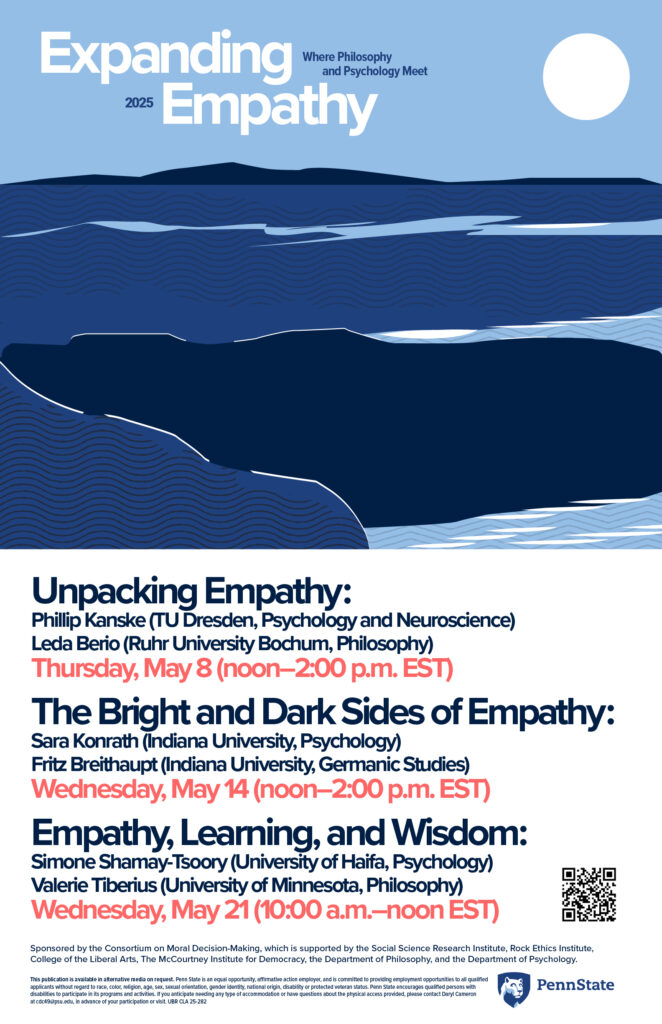
Here are the speaker titles and abstract for this year’s series. Here’s the first session on May 8 (12-2pm EST):
Philipp Kanske (TU Dresden): “Empathy and perspective-taking: Investigating the routes to understanding others”
Abstract: Social relationships are among the most essential factors for both mental and physical health. Therefore, the question about the capacities that enable us to build and maintain good social relationships is of crucial importance. The presentation focuses on the remarkable ability to understand the inner, mental states of others. This includes empathy, here defined as the sharing of others’ feelings, and perspective-taking, defined as the abstract representation of others’ mental states. Extensive research from recent years show that empathy and perspective-taking are separable and are supported by distinct neural networks. Mental disorders can be associated with specific deficits in either of these abilities. For understanding social difficulties in people with mental disorders, (1) the interplay of empathy and perspective-taking and (2) methodological advancements toward more realistic, (inter)active neuroscientific research designs could also be decisive. The presentation concludes with new approaches in prevention and treatment that are based on social-interactive elements and specifically aim to improve empathy and perspective-taking.
Leda Berio (Ruhr University Bochum, Philosophy): “Empathy, Social Cognition, and Artificial Agents: Emotions and empathy through the lens of our interactions with technology”
In this talk, I look at how empathy and its subcomponents play out in social interactions, and use interaction with artificial agents as a tool to take a closer look at some of the cognitive mechanisms underlying affective social interactions. In particular, I analyze two different phenomena: our attribution of emotional states to artificial agents such as robots, and our use of AI to obtain empathic feedback. I argue that understanding HRI as partially modulated by script activation informs us on how situationally-bound and normative our affective attributions can be; I further argue that, in the case of chatbots simulating empathic exchanges, seeing empathy as a form of validation towards our self-narration allows us to see some of its possible risks. Both forms of interaction with artificial agents thus help us shade some light on forms, functions, and normative repercussions of our affectively loaded interactions.
Here’s the second session on May 14 (12-2pm EST):
Sara Konrath (Indiana): “Harnessing the power of empathy”
Abstract: My talk will define empathy, describe ways that people can miss the mark, and ways to practice it genuinely. I’ll summarize research on potential benefits of empathy for prosocial behaviors, relationships, and empathic individuals. I’ll then share our research on changes in empathy in American youth, followed by some suggestions on practices that can help to support and build empathy.
Fritz Breithaupt (Indiana): “Potential dark sides and abuses of empathy”
Abstract: I will address how empathy can lead to side-taking dynamics that lead to polarization and even violence; I will address potential self-loss by empathizers; expectations of thankfulness by empathizers that can drive resentment; and vampiristic empathy. These ideas will not lead me to be against empathy, but to address inherent tensions and potential abuses of empathy.
Here’s the third session on May 21 (10am-Noon EST):
Simone Shamay-Tsoory (University of Haifa): “A two-brain approach for understanding empathy”
Abstract: Empathy is the powerful force that enables us to understand and connect with each other’s emotional experiences. While we’ve made great strides in uncovering the neural foundations of empathy, most research so far has focused on passive observers engaged in artificial tasks in socially deprived environments. In my talk, I will introduce an approach that examines both the brain of the person experiencing distress and the empathizer, creating a dynamic feedback loop. I’ll present a new brain model that reveals how empathic responses actively reduce emotional pain. Through a series of experiments exploring inter-brain synchrony during empathic interactions, I will show that this inter-brain synchrony is a predictor of how effectively distress is regulated in the person suffering. Expanding on this, I’ll share exciting new findings suggesting that inter-brain synchrony can be trained—offering profound insights into the potential to cultivate and enhance empathy.
Valerie Tiberius (University of Minnesota): “Well-being, value fulfillment, and empathy”
Abstract: What is the relationship between individual well-being and empathy? Before we can answer this question, we need to know what well-being is. In this talk, I’ll argue for a philosophical approach to well-being that is informed by empirical psychology. This approach focuses on the fulfillment of values, which I take to be a special kind of goal. In the last part of the talk, I’ll turn to questions about empathy, how we value it, and what the availability of empathetic chatbots means for our values and well-being.